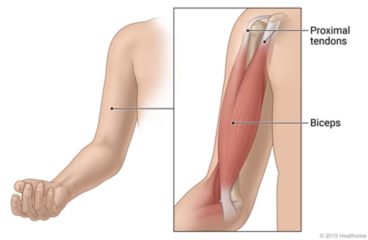
What is proximal biceps tendon tear surgery?
Surgery for a proximal biceps tendon tear fixes a tendon that is torn near the shoulder. The proximal biceps tendon connects the biceps muscle to the shoulder blade.
A biceps tendon treatment is usually done as arthroscopic surgery. Your doctor puts a lighted tube and other surgical tools through small cuts (incisions) in your shoulder. The lighted tube is called an arthroscope, or scope. Most people go home the same day of the surgery.
Your doctor may choose to do an open surgery. The doctor will make a 2- to 4-inch incision over your shoulder. If you have open surgery, you will probably stay in the hospital overnight.
In both surgeries, scars usually fade with time. The shape of your biceps should remain the same.
Your arm will be in a sling for about a month. You will need rehabilitation (rehab). This will probably start 1 to 2 weeks after your surgery and last for 2 to 3 months. It will take about 4 to 6 months for your shoulder to heal.
You may be able to do easy daily activities in 2 to 3 weeks, as long as you do not use your affected arm. Most people who work at a desk job can go back to work in 1 to 2 weeks. If you lift, push, or pull at work, you may be able to go back in 3 to 4 months. You should be able to throw objects and play sports 4 to 6 months after the surgery. How long your recovery takes depends on your injury and how well your rehab goes.
How do you prepare for surgery?
Surgery can be stressful. This information will help you understand what you can expect. And it will help you safely prepare for surgery.
 Preparing for surgery
Preparing for surgery
- You may need to shower or bathe with a special soap the night before and the morning of your surgery. The soap contains chlorhexidine. It reduces the amount of bacteria on your skin that could cause an infection after surgery.
- Be sure you have someone to take you home. Anesthesia and pain medicine will make it unsafe for you to drive or get home on your own.
- Understand exactly what surgery is planned, along with the risks, benefits, and other options.
- If you take a medicine that prevents blood clots, your doctor may tell you to stop taking it before your surgery. Or your doctor may tell you to keep taking it. (These medicines include aspirin and other blood thinners.) Make sure that you understand exactly what your doctor wants you to do.
- Tell your doctor ALL the medicines, vitamins, supplements, and herbal remedies you take. Some may increase the risk of problems during your surgery. Your doctor will tell you if you should stop taking any of them before the surgery and how soon to do it.
- Make sure your doctor and the hospital have a copy of your advance directive. If you don't have one, you may want to prepare one. It lets others know your health care wishes. It's a good thing to have before any type of surgery or procedure.
What happens on the day of surgery?
- Follow the instructions exactly about when to stop eating and drinking. If you don't, your surgery may be canceled. If your doctor told you to take your medicines on the day of surgery, take them with only a sip of water.
- Follow your doctor's instructions about when to bathe or shower before your surgery. Do not apply lotions, perfumes, deodorants, or nail polish.
- Do not shave the surgical site yourself.
- Take off all jewelry and piercings. And take out contact lenses, if you wear them.
 At the hospital or surgery center
At the hospital or surgery center
- Bring a picture ID.
- The area for surgery is often marked to make sure there are no errors.
- You will be kept comfortable and safe by your anesthesia provider. The anesthesia may make you sleep. Or it may just numb the area being worked on.
- The surgery will take about 2 hours.
- Your shoulder will be in a sling.
Current as of: July 17, 2023
Author: Ignite Healthwise, LLC Staff
Clinical Review Board
All Healthwise education is reviewed by a team that includes physicians, nurses, advanced practitioners, registered dieticians, and other healthcare professionals.

